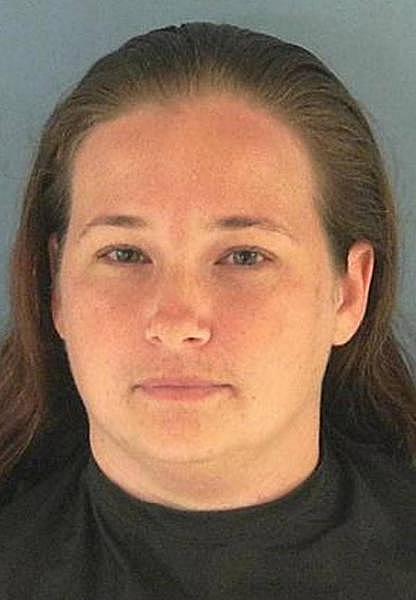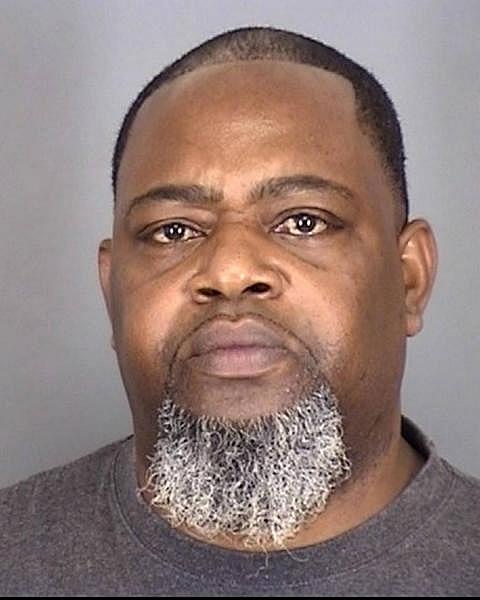Criminal record? Horrible work history? Florida juvenile justice would still hire you
This article and others in this series were produced as part of a project for the University of Southern California Center for Health Journalism’s National Fellowship, in conjunction with the USC Annenberg School for Communication and Journalism.
Other stories in the series include:
At this juvenile justice program, staffers set up fights — and then bet on them
Dark secrets of Florida juvenile justice: ‘honey-bun hits,’ illicit sex, cover-ups
FIGHTCLUB: A Miami Herald investigation into Florida’s juvenile justice system

From left to right, Sara Erin Martin, Uriah T. Harris and Tommy Williams were hires the juvenile justice system would eventually regret.
By Carol Marbin Miller and Audra D.S. Burch
On the surface, Sara Erin Martin would have seemed well qualified to oversee troubled teens at the Okeechobee Youth Development Center. For three years, she’d worked as a mental health technician at a state psychiatric hospital for adult inmates whose mental illnesses or intellectual disabilities rendered them unfit to be tried or punished.
But there was a flash of foreboding on her job application, which said her separation from the Treasure Coast Forensic Treatment Center had been “involuntary.”
Unfazed, Okeechobee made her a youth care worker.
Martin lasted 76 days, until a boy told authorities a shocking story about Martin, complete with romantic takeout dinners, naked cellphone pictures, a butterfly or dragonfly tattoo, a blue sex toy and carnal assignations on the bathroom floor.
The men and women who enforce rules, dole out discipline, offer guidance, and — in many of the facilities — help decide how long teenagers must remain locked up are the foundation of the youth correctional system. Some have backgrounds, and even criminal records, little better than the youths they supervise.
Sarah Erin Martin Okeechobee County Sheriff’s Office
A cursory dig into Martin’s record would have shown she’d been ousted from the prior job for an “inappropriate relationship” with a detainee at the Indiantown mental hospital, a bright red flag.
Another neon warning sign: workers who, in the past, committed disturbing crimes. Child abusers, murderers and rapists, for example, have committed “disqualifying offenses” and aren’t supposed to work with vulnerable youths. But the devil is in the details, and the details sometimes get lost when offenders plead guilty to lesser offenses that aren’t disqualifying. Juvenile justice administrators acknowledge that, for years, they haven’t bothered to look for the details.
Tommy Williams’ arrest for clobbering a severely disabled man he was paid to protect didn’t discourage his prospective employers at the Duval Youth Academy. They hired him.
Uriah T. Harris’ rap sheet featured a long string of arrests, including aggravated battery and child neglect. That didn’t deter his future bosses at the Avon Park Youth Academy.
Both were hires that would prove regrettable.
For Williams, Harris and hundreds of juvenile justice system employees, problematic pasts were hiding in plain sight, either inside the personnel records of Florida sister agencies or in the Florida Department of Law Enforcement criminal database.
By cross-referencing FDLE, Florida Department of Corrections and Department of Juvenile Justice databases, the Herald found that Florida’s youth corrections programs are sprinkled with hundreds of staffers who were jettisoned by the adult prison system or staffs at local jails but welcomed by institutions looking after incarcerated youths. Some had short-lived second-chance stints. Others remain on the job.
The exact number of purged prison guards hired to work with delinquent kids is difficult to pinpoint: Juvenile justice leaders declined to provide the Herald with dates or years of birth, as other agencies did, making it difficult to confirm every match.
Still, an examination of the databases identified about 350 former guards or law enforcement officers who were hired by DJJ or one of its contractors after being terminated — or allowed to resign while under investigation — for wrongdoing. Those included about 74 employees who were caught sleeping on the job or failing to show up for work, and 66 who were fired for a “moral character” violation. An additional 47 employees were hired after they resigned or retired while being investigated for such a serious breach.
“If you cannot work with adults in the system, then you should not be allowed to work with juveniles who are vulnerable — children who have less power and less ability to complain,” said Nancy Hamilton, the retired president of Operation PAR, a Pinellas County addiction treatment program that works with troubled children.
11 arrests, no problem

Uriah Harris turned an ordinary broom into a weapon, and then gave it a name.
At the time he was hired by the Avon Park Youth Academy to supervise boys, he had been arrested 11 times. The charges included arrests for resisting an officer, loitering and prowling, aggravated battery and domestic violence, child neglect, failure to appear and contempt of court. Harris could not be reached by the Herald.
He lasted two years at Avon Park, only to be fired after three boys reported that he gave them “licks” from a broomstick for cursing, swiping snacks and other rule violations. He named the weapon “Broomie.”
“If there is any hint of any kind of violence in their history, then we cannot afford to let them be around children,” said Hamilton, whose agency was a founding member of the state Juvenile Justice Association, an industry group, and who served as its president. “We don’t have to hire them. We won’t.”
DJJ spokeswoman Heather DiGiacamo said Harris, who worked for a contractor-managed program, “met the statutory requirement for hiring as he was never prosecuted for a disqualifying offense,” but added: “We expect discretion and common sense to play a role when evaluating every potential staff member.”
Christina K. Daly, DJJ secretary, reviewed her agency’s past hiring practices while releasing employment records to the Herald. In an interview, she described them as “alarming.” Although the department did background checks on its own prospective hires, it did not insist on receiving the disciplinary files of fired corrections officers or other state employees. The department also did background checks of prospective employees on behalf of contract providers, but did not have the authority to veto candidates absent an arrest and conviction for a disqualifying offense, she said.
“The hiring practices are what they have been. There’s not much I can change about the past,” Daly said.
Daly: It’s not all about salary
DJJ Secretary Christina K. Daly says the culture and work environment are just as important as salary in keeping juveniles and staff members safe. -Emily Michot
“We have got thousands of dedicated people in this agency. I would put our staff up against a lot of other agencies,” she added.
Still, DJJ is considering changes to how officers are recruited, including marketing the agency at college campuses and job fairs, and getting the word out that — in Daly’s words — “this is an agency that’s an honor coming to work for.”
Anger management

Florida’s background screening law would appear designed to weed out people such as Tommy Williams.
When the Duval Academy hired Williams as a youth counselor at its mental health treatment center, administrators had an abundance of public records at their disposal to help predict how he might react when someone annoyed him.
They all described what happened on a November day in 2013 when Williams struck a developmentally disabled man in the group home where he worked.
There was the arrest report by the Clay County Sheriff’s Office, a sworn statement by the Florida Attorney General’s Office, an incident report by the state Agency for Persons with Disabilities, an investigation by the Department of Children & Families, and Williams’ FDLE rap sheet.
Williams, who lost his job at the group home, expressed regret for punching the man, saying: “he is trained [in] how to safely handle difficult situations and withdraw himself from any potential confrontation, and he is aware that his striking of [the disabled man] was wrong, and a violation of state law.”
The Duval Academy hired him while he was still on probation for battery — a condition of which was to complete an anger management class. It didn’t take.
On April 18, 2015, Williams was arrested again, this time by the Jacksonville Sheriff’s Office, after he went into the room of a detained youth named Akillious Ashley. Akillious was in foster care, an occasional runaway with a drug problem, and was available for adoption from the child welfare system.
“He is approaching his adult years and will need positive guidance transitioning into adulthood,” the adoption agency wrote.
Instead, Akillious was clubbed on the face with a flashlight by Williams, sending him to the hospital. A murky black-and-white video obtained by the Herald shows Williams backing out of the youth’s room, while pounding him twice on the forehead with the flashlight. Williams, weapon still in hand, then calmly walks away to his office.
Tommy Williams, hired at Duval Academy despite being on probation for battery, bludgeons Akillious Ashley with a flashlight, after which, they scuffled. Akillious said he asked the officer for a glass of water. -Florida Department of Juvenile Justice
Akillious, who spoke to the Herald by phone from the Duval County Jail, said he asked Williams for a glass of water, and the guard inexplicably erupted. He said the attack split his forehead and left soft tissue dangling. He has a scar where doctors stitched him up.
An August 2015 inspector general report broadly confirmed Akillious’ account, saying Williams went to the “sub-control” room to get a set of keys so he could unlock the detainee’s door. Video shows Williams “swinging the flashlight two times.” A youth counselor who witnessed the attack said “blood was flowing” from Akillious’ head.
Akillious Ashley
“I was bleeding everywhere. I was really dizzy. I didn’t know what was going on,” said Akillious, who has been relocated since the interview to Cypress Creek Treatment Center on drug, car theft and burglary charges.
Williams was fired again, charged with aggravated battery with a deadly weapon, and pleaded guilty to felony battery. Again, he was placed on probation. Again, he was ordered to “enroll in and successfully complete anger management classes.” Williams could not be reached by the Herald.
Had Williams pleaded guilty to battery of a disabled person when he was first arrested, state background screening laws would have precluded his hiring. Because he pleaded to the lesser charge of simple battery, the law didn’t apply.
DiGiacamo, of DJJ, confirmed: “Mr. Tommy Williams pleaded to an offense which was not disqualifying.”
One reason DJJ struggles to find better applicants: The starting salary for a detention officer at a state-run lockup is $25,479.22.
Contract providers pay even less. TrueCore Behavioral Solutions — the biggest provider after acquiring more than two dozen contracts earlier this year — offers $9.50 per hour, or $19,760 per year, the company said.
A worker on either income with a spouse and a child would qualify for food stamps. Base salaries in the adult correctional system were recently raised to $33,500, said Department of Corrections spokeswoman Michelle Glady.

On Sept. 29, as this project was about to be published, Gov. Rick Scott made a surprise pronouncement: a proposed 10 percent pay increase for juvenile detention officers.
Scott said these officers have “the unique opportunity to help change lives and redirect our youth to a successful path.”
The Legislature has to approve the raise. It wouldn’t help the $19,760-a-year employees in TrueCore’s residential programs — or other facilities run under DJJ contracts.
Polk County Sheriff Grady Judd, who has been on a self-proclaimed “warpath” over conditions in a youth program in his jurisdiction, said he pays officers who supervise youths before trial an entry salary of $43,000, and gives them 900 hours of training, compared to 240 hours over two phases for officers in the juvenile system. His state counterparts, he said, “are hiring people at just about the minimum wage” and barely training them. “What other results do they expect to get from that?”
“An absolute, total wreck,” he added.
Three Highlands Youth Academy administrators arrested for running abusive program
Three former high-level administrators at Highlands Youth Academy have been arrested, charged with running a program steeped in abusive treatment of youths, cover-ups and illicit sex between staff and detainees. -Scott Wheeler
Dale Dobuler, who worked for two decades as a juvenile justice administrator — leaving the industry when he resigned as superintendent of the Miami-Dade detention center to become a lawyer — said higher salaries and greater education are key to recruiting better staff. “The states that have tackled this, and tackled it effectively, take a different approach,” he said. “They require college degrees. They pay more and they get a higher caliber of person.”
The more generous salaries, he said, help administrators lure employees who are seeking to scale the ladder in juvenile justice — they may work on a master’s degree at night, or study social work — and see the job as a profession.
“They are not only better trained and educated, they are less likely to do stupid things to kids,” Dobuler said.
On-the-job training is unlikely to compensate for what many of the hires lack, said Myhosi “Josie” Ashton. She was a mental health counselor who worked for four years as a DJJ program specialist, training youth care workers in behavior management. She said she regularly warned supervisors and managers about workers she considered dangerous — those with short fuses or little understanding of youth behavior.
“I would say this guy is off the chart, and he’s going to do more damage than good,” Ashton said. “They would just send him back to the floor. That was common practice.”
The groper
With the prison guard rejects turned youth workers, the signs of trouble often were unmistakable. The infractions that led to firing ranged from quite serious — a high-ranking officer accused of forcibly groping an underling — to the comically absurd, such as one case in which a top prison official was cashiered for producing phony state credentials for softball team ringers.
Willie James Cox became a youth care worker after he was charged with assaulting a subordinate at Gadsden Correctional in Quincy. Prison records show that Cox, a lieutenant who weighed an imposing 325 pounds, grabbed the officer from behind, clutched her breast, and unbuckled her belt. “I asked him to stop, because I really didn’t want him to do what he was doing,” the woman wrote in a statement.
DO YOU UNDERSTAND HOW MANY PEOPLE COME TO ME? THE WOMEN COME TO ME [INAPPROPRIATELY] AND ASK ME, ‘HEY, HEY, CAN WE GO OUT SOMETIME?’ - Willie James Cox, corrections lieutenant ousted for allegedly groping a subordinate, later hired by the juvenile justice system
Cox “began to tell me how long he had been wanting to do this to me,” she wrote. Cox then pulled her pants down and rubbed her buttocks. “Lt. Cox then said ‘just let me touch it.’ I said ‘no. I want you to stop.’ Lt. Cox said ‘I know how far to go.’ I said ‘Lt. Cox you have gone too far already.’ ”
Cox denied the allegation, and told investigators he was a magnet for the romantic advances of female colleagues. “You would think that people will be looking at me saying, ‘hey, stay away from him ... don’t talk to him,’ ” Cox said. “Do you understand how many people come to me? The women come to me [inappropriately] and ask me, ‘hey, hey, can we go out sometime?’ ”
Cox was actually a magnet of a different kind — for harassment and abuse allegations.
According to prison system documents, Cox told a colleague that the subordinate’s complaint “was the fourth allegation of this nature in a year’s time, and that he might lose his job.” The corrections department provided the Herald with records for two previous incidents: a five-day suspension in 2002 for touching “between [a] senior correctional officer’s legs,” and a 2003 reprimand for repeatedly making sexual comments about a subordinate’s “body parts,” and then yelling at her when she spurned his advances.
Cox not only lost his job, he was prosecuted. He was convicted of misdemeanor battery, and sentenced to a year’s probation. The Criminal Justice Standards and Training Commission stripped him of his certification, saying he also lied to investigators. He then went to work at the Juvenile Unit for Specialized Treatment, a residential program in the Panhandle town of Bristol offering mental health treatment to youths.
He remained there until 2015, when he resigned due to illness, a spokeswoman said. The Herald tried unsuccessfully to reach him.
The ‘nut tapper’
Alan W. Hughes left two law enforcement agencies under a cloud. In 1997, state law enforcement certification records show, he was drummed out of the Lee County Sheriff’s Office for unspecified “misconduct.” Four years later, he resigned from the Lake Placid Police Department while under internal affairs investigation for a “moral character” violation: sexual harassment.
A female colleague had complained that Hughes “made sexually suggestive comments,” gave her material of a “sexual nature,” and groped her bottom on a stairwell. “You have a nice one,” she claimed he said. Another woman told the department he had made offensive comments to her, too. Hughes denied all of the allegations. And though he resigned while the matter was being investigated, the department later concluded it could not sustain a charge of sexual harassment.
Five years later, DJJ hired Hughes to work at the Southwest Florida Regional Juvenile Detention Center, where he remained for three years.
Details of Hughes’ alleged misdeeds have vanished, as DJJ destroys investigations after five years, as the law allows. A short report remains, though, and it says Hughes and a colleague enlisted youths — one as young as 13 — in a game they called “nut tapping.” The object of the endeavor was simple: punching children in their testicles. A report said Hughes “personally ‘nut-tapped’ a youth,” and “improperly supervised youths, permitting them to engage in ‘nut tapping.’ ” He was fired in January 2010.
Hughes told the Herald he had planned to resign from Lake Placid regardless of the investigation in order to raise his newborn son. He said DJJ was aware of his work history. “They did a background check,” Hughes said. “Both jobs were disclosed in my application.” As to his departure from DJJ, Hughes said the agency chose not to retain him following his probationary period. “I never arranged to do anything like that,” he said of the “nut tapping” allegations. “That’s ridiculous.”
THE EXACT NUMBER OF PURGED PRISON GUARDS HIRED TO WORK WITH DELINQUENT KIDS IS DIFFICULT TO PINPOINT: JUVENILE JUSTICE HEADS DECLINED TO PROVIDE THE HERALD WITH DATES OR YEARS OF BIRTH, AS OTHER AGENCIES DID.
One woman resigned from the prison system while being investigated for “a staff/offender relationship.” The “relationship” included providing the inmate with contraband, sending him money, corresponding with him under a fake name and maintaining a close connection with his family. Less than half a year later, she landed at the Okeechobee Youth Development Center for high-risk boys after claiming she quit the prison only because her “uncle had both his legs amputated,” and caregiving made it impossible to fight the allegations.
One corrections officer was busted for possession of drug paraphernalia and cannabis under 20 grams — a career ender — exactly three weeks after joining the staff of the Osceola County Jail. He was hired in 2013 as a youth care worker at Avon Park Youth Academy.
Another corrections officer surrendered his adult corrections job after introducing contraband into a prison. In his cargo pants, he had nine packs of cut-rate “305” cigarettes, preferred brand of the lucrative, cutthroat prison underground.
He experienced a soft landing just over a month later, when he was hired in 2012 as a youth care worker at Union Juvenile Residential Facility, which treats sex offenders.
Praying, not snoozing
A sergeant was ousted from the prison system in 2011 for violating “moral character standards.” A memo from the warden cited excessive absenteeism, abuse of sick leave, substandard work, conduct unbecoming a corrections officer, failure to tell her superiors about a criminal arrest — passing a worthless check — and failure to follow orders.
When the sergeant later applied to DJJ, the prison system gave her a stellar review: “Captain stated if we don’t want her to please send her back to prison to wk [sic],” the DJJ screener wrote. She ended up at the Alachua Regional Juvenile Detention Center.
Another officer “resigned in lieu of separation” from the prison system after being spotted sleeping on the job twice in less than a month. (He said he was praying, not dozing.) He later was hired by juvenile lockups in Orange and Alachua counties, in 2012 and 2013. The man was one of many prison system malingerers welcomed by DJJ.
As the Herald reported this story, submitting numerous records requests, DJJ scrambled to shore up screening procedures.
“Effective immediately, for all direct care positions, when a candidate has worked for a state agency, a copy of their file must be requested or an official file review must be performed, before they can be considered for employment,” T. Dodie Garye, DJJ’s chief of human resources, wrote in a memo dated April 10, 2017.
A month later, she sent a follow-up directive, stipulating that screeners must obtain disciplinary actions, performance reviews, investigations, memos of counseling, corrective actions and settlement agreements before any former state employee is offered a job. The word “must” was underscored.
THE HIRING PRACTICES ARE WHAT THEY HAVE BEEN. THERE’S NOT MUCH I CAN CHANGE ABOUT THE PAST. WE HAVE GOT THOUSANDS OF DEDICATED PEOPLE IN THIS AGENCY. I WOULD PUT OUR STAFF UP AGAINST A LOT OF OTHER AGENCIES. -Christina K. Daly, DJJ secretary
Daly told the Herald that state agencies would in the past confirm hiring and departures and salaries — and nothing more.
“We’re taking it a step further and requesting, and really requiring, that we do our due diligence to look through the entire personnel file, because I think it’s important,” she said.
Though DJJ will be bound by the new rules, its contractors won’t, Daly said, except to the degree that her administration can encourage the providers to comply. “We kind of lay out our expectations. They have their own hiring practices ... but we can certainly help guide some of that,” she said.
Takeout and tattoos
Sara Martin’s secret past spilled out one night when a boy at Okeechobee gave another worker a $20 bill, and asked her to order out for dinner. When asked how he came upon the contraband cash, he said Martin gave it to him for his birthday. That raised a question: What else had Martin done for him?
The investigation found that while recovering from surgery for a broken jaw, the boy was confined to the infirmary. Martin worked there every Monday night. The Okeechobee Sheriff’s Office paraphrased the boy’s statement from there:
“Martin asked if I wanted to have sex, and I told her yes. We went into the bathroom,” he said. “I got a glove from [a nurse’s station] and used it as a condom.”
In addition to the cash, Martin gave him access to her cellphone. There, he told police, he found naked pictures of her, including one of her holding a blue sex toy.
“Every Monday when Martin watched me, we had sex in this bathroom,” he said.
Police had good reason to believe the boy. He directed them to the bathroom, where he said they’d find a black and gray sheet used for sex on the shower floor. They found it. He told them she had a tattoo of a dragonfly or butterfly below her bellybutton.
They looked. She did.
“She offered it, and I am locked up,” the youth told police. “I am not going to turn it down.”
Martin said the boy was making up everything except for the takeout food and the cash, which she shared because she felt sorry for him.
“Why is his word more valuable than mine?” she asked a detective.
When the Herald asked G4S, the British-based company that ran Okeechobee until recently, for a copy of Martin’s personnel file, scores of pages were entirely blacked out. Neither G4S nor DJJ responded to questions from the Herald about whether they knew the details of Martin’s background.
Martin pleaded no contest this past May to felony battery charges, and was placed on five years probation. Prosecutors dropped two counts of sexual battery and sexual activity with a minor. Martin could not be reached, and her attorney did not return calls from the Herald.
A pat-down and a kiss
Viviana Hernandez-Trejo kissed but didn’t tell.
Hernandez-Trejo was fired from her job as a corrections officer in June 2013 for kissing an inmate, and patting him down “inappropriately.”
She also had been disciplined for excessive absenteeism, having her driver’s license suspended, and then cursing at her supervisor when asked to sign a written reprimand. She additionally failed to do security checks, for which she was given a 20-day suspension.
Four months later, in an application for a similar job watching delinquent youths, Hernandez-Trejo explained her departure with a whopper. She said the prison had been “shut down” — a statement easily disproved by a Google search.
Getting the job at Tampa’s privately managed Riverside Academy was easier than keeping it. In April 2014, a teenage boy bragged that she gave him McDonald’s burgers and Taco Bell takeout, pastry, candy and use of her cellphone for Facebook and Instagram updates in exchange for a variety of sex acts.
The phone, a magenta-encased Samsung Galaxy, became a focus of the investigation — and the spark for an early morning brawl. Detectives tried to seize the phone when they visited her house on June 18, 2014. A test of wills ensued. Hernandez-Trejo told a detective “that she was not taking her cellphone,” a police report said.
As a detective began to fill out a seizure form, Hernandez-Trejo “lunged at the car and grabbed the cellphone,” the report said. She then “started to bang the cellphone on the trunk” of the squad car, trying to smash it. As Hernandez-Trejo struggled with police, her five children poured out of the house, the report said. She yelled at them “to get the cellphone and destroy it.”
Even after Hernandez-Trejo was handcuffed, she continued to fight for the phone. It remained intact. Hernandez-Trejo’s elbow didn’t. It was broken in the fracas.
The phone yielded eyebrow-raising evidence, including pictures of a former detainee. In a Facebook chat dated June 13, 2014, Hernandez-Trejo said she “fell for an inmate,” and swooned over him as “built and decent.”
“Yeah,” she wrote, “I had a taste of his naughtyness,” the police report said. “If I knew I was gona get fired, id do it..n say f..it..”
She was fired.
The Tampa police report on alleged wrongdoing at Riverside spanned more than 100 pages.
The boy told police he “decided to get ‘face’ with Ms. V to see what kind of special privileges that he could get.” It started small, with him sitting next to her, and fondling her outside her clothing, he told a detective.
They didn’t stop there, he said. He penetrated her with his fingers, and she performed oral sex on him while he sat at a desk in an empty classroom, the police report said. Once, he told police, she performed oral sex in an elevator as they went downstairs to fill a water cooler.
Now and again, she behaved like a role model: “She would write things in his composition notebook,” the police report said, things “like ‘do good’ or ‘stay on the right track.’ ”
IF YOU CANNOT WORK WITH ADULTS IN THE SYSTEM, THEN YOU SHOULD NOT BE ALLOWED TO WORK WITH JUVENILES WHO ARE VULNERABLE — CHILDREN WHO HAVE LESS POWER AND LESS ABILITY TO COMPLAIN. -Nancy Hamilton, retired president of Operation PAR, a Pinellas County addiction treatment program
Hernandez-Trejo could not be reached by a reporter. But she told police in a wide-ranging interview that she never behaved inappropriately with youths in her care. She said that, with a supervisor’s approval, she twice gave food treats to boys — including a vending machine honey bun on one occasion — as a reward for helping clean up trash.
Tampa police detectives asked prosecutors to charge Hernandez-Trejo with sexual battery. The state attorney declined. The Herald was unsuccessful in reaching Hernandez-Trejo.
The investigations by police, juvenile justice administrators and the state child welfare agency, did, however, put an end to Hernandez-Trejo’s career in corrections.
When investigators examined Hernandez-Trejo’s phone, they found a May 15, 2014, email from the Florida Department of Corrections recruitment center.
Her application for a job as a corrections officer was being flagged — after screeners realized they’d previously fired her.
[This story was originally published by the Miami Herald.]

